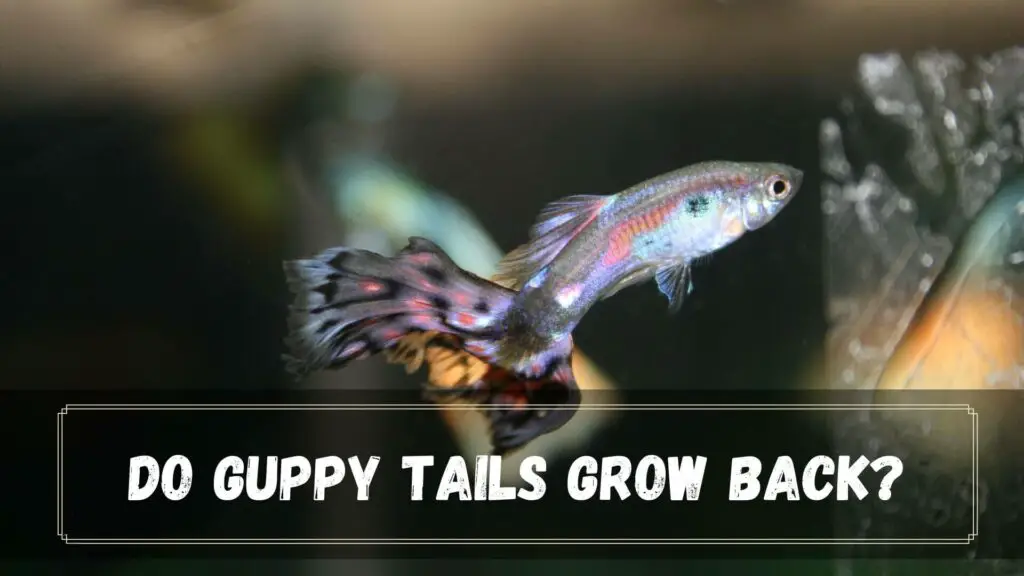On many forums and social sites, people debate the answer to the question: do guppy tails grow back? & Do guppy fins grow back?
In this article, I am going to answer both questions in detail. We’ll also learn the cause, precaution, treatment, and tips regarding fin and tail loss.
Article Contents
Do Guppy Tails Grow Back?

Guppy fishtails grow back as long as the damage is not severe. It usually takes about 4 to 6 weeks to heal when its dorsal fin is given enough time.
However, there are a few things that you need to do to help your guppy’s tail to regrow. There are many things that an owner must address first before they should go about waiting for them to heal.
No matter how your guppy’s tails get damaged, the very first thing you should know is how to treat it before waiting for it to heal. Let’s learn some things that you must address before waiting for guppies to begin to heal.
What To Do First?
- You must clean the water. It is recommended to replace water because it usually prevents fin rot.
- Keep the tank water parameters and condition optimal with 0 ammonia level.
- Quickly prepare to relocate your guppy if there is any ammonia present in the water. The ammonia level will usually cause severe burns on the damaged tail and its skin.
Why Should You Clean The Tank Water?
Ammonia present inside the water will damage and burn their skin. Poor quality water will always result in tail rot due to tail loss. This is why the first thing you should do is do a significant fat water change.
Even after a good water change and tank cleaning, guppies’ damaged tail can have some bacteria left, which is why you should never expect too much. Who knows, at the end of the day, the tail loss will result in tail rot.
Why Do They Lose Their Fins?
Throughout their life, it is normal for guppies to experience some tails damage. Minor damage usually heals faster, whereas depending upon the severity, it can be deadly.
Most damage in the tail is visible if looked at and inspected close. Most of these minor injury or damage goes away several days later on their own.
Let’s learn the cause of tail damage and fin damage.
3 Cause Of Guppies’ Tail Loss
Injury.
An injury due to any reason can result in tail loss. In most cases, they are touching an object present inside the aquarium or being bullied by extensive fish results in injury.
This kind of injury tends to be minor and usually heals up naturally within a few weeks. The first thing you should do is find the root cause of the damaged fin or tail to fix the situation.
For example, if you find bullying is the cause behind an injury, instantly separate them. It is always recommended to keep the guppies with their tankmates. Here, we have shared a detailed guide on what fish guppies can live with.
In most cases, bullying doesn’t cause severe injuries unless it is repeated. It is widespread for a vulnerable and stressed-out guppy to experience infections due to multiple bullies.
You must identify any bullying behavior to take action. Other than that, if you’re placing a rugged object or a plant that is causing damage to their skin when swimming around, get it removed.
Disease.
Tail rot is the most common ailment that is often a major cause of tail loss. The primary reason for tail rot in stressed guppies. If you keep your guppies in deplorable tank condition or water, then it can stress them out.
Constant bullying will weaken the immune system, which is also the cause of fin rot. If a puppy’s immune system is weak, it will be vulnerable to many viruses and bacteria.
The outcomes can be either fungal or bacterial fin rot. Each of both conditions needs different types of treatment.
You are talking about the symptoms of fin rot, visible tears in your guppy’s tail, tail loss, loss of appetite, and significant discoloration.
These kinds of symptoms usually exhibit deadly results and proportions. Fortunately, fin & tail rot are easily curable in the early phases, although it takes a week to heal. It might help if you don’t left it untreated.
Fighting.
Keeping guppies male together often results in physical violence. Guppy males tend to be highly territorial and will always protect their right to food fiercely.
If you keep many males with fewer females, fighting can spell disaster shortly.
To prevent such a situation, you should keep the ratio of male and female guppies equal. Plus, you should increase the tank size with more hiding spots.
How To Help Guppies With Tail Loss?
Quarantine
In any case, if you notice a guppy with fin rot, you should immediately quarantine it. In most cases, the owner tends to be unknown or unsure about the condition.
However, before placing an unhealthy guppy, you should get them a separate tank that replicates the main tank’s environmental and water conditions.
Plus, it is perfect for protecting the healthy guppies in case fin rot becomes contagious.
Add Some Salt In The Tank Water
One of the things that I learned from an experienced owner is that adding Salt to the freshwater aquarium is the best preventive method for fin and tail rot.
Plus, it also has a high chance of treating it. A small dose of Salt is not going to hurt your guppies. However, you should be aware of snails and shrinks living in the same tank.
It’s a good idea for a guppy tank as long as it has no anthropoids.
The best method to Salt your tank water is taking 1 tsp iodized salt per 1 gallon of water. Before taking any amount of Salt, you should always consider how much water the decorations, plants, and the substrates inside the aquarium displace.
If you cannot salt your aquarium due to the presence of other types of fish, shrimp, or snails, you should set up a separate small tank.
It’s always a good idea to have a small hospital tank for guppies.
Get Them Proper Reach To Food
In most cases, the Guppies with damaged fins or tails find trouble swimming around and reaching their food if there are too many fish. This is mainly for female guppies because they tend to be timider and avoid confrontation with other fish.
It is always recommended to keep them in a separate tank and give them regular food. You should avoid feeding them lousy quality food or outdated food. I will recommend you provide them with brine shrimp.
API Mealafix (Optional But Recommended In Severe Cases)
It is optional but recommended if the tail rpt seems to be severe or painful for your guppy. It’s a commercial treatment and is basically—a bacteria removal medication.
It is very effective in case of an outbreak and also as a cure if everything else fails. You need to mix it with the water.
There are many other fin and tail rot treatments available in the market & online, but most of them are solutions, Salt, or liquid.
Some of them are just medicated food which works for a few in the early phases. It is never recommended to mix Salt if you use any medication.
Now Wait And Monitor
Now you should wait and monitor your guppies from time to time. You should also avoid any possibility of a bacterial infection or anything associated with it.
The tank should be cleaned; in a few weeks, you should see your guppies healing. Ripped tails and fins usually begin to heal and repair themselves within a few days.
Do Guppy Tail Fins Grow Back?
Yes, guppies have the ability to regrow their tails and fins but don’t expect anything exceptional. After all, they are not lizards. Guppies will heal some damage, but only up to a point. If the injuries are too significant, their healing capacity will no longer be 100% effective.
Today, we will dive into the guppies’ healing abilities, aiming to shed light on the problems they might face along the way.
Do Guppy Fins Grow Back?

Guppies’ fins grow back as long as the damage is minor. In case of severe injury or fin rot, it can be deadly. Fin rot is a bacterial infection that often tends to be the cause of tail loss.
Unfortunately, guppy fish can’t completely regrow/regenerate their entirely lost tail or fin. If the damage is minimal, their fin will regrow within 4-6 weeks naturally.
- Remove all kinds of decorations from the tank to prevent guppies from bumping into each other and getting severely injured.
- Keep the male to female ratio healthy or equal. Being hyperactive, male guppies fight, especially in mating season. Guppies can be very aggressive when it comes to competing with females.
I highly recommend keeping a 1:3 ratio between male and female guppies inside the tank ( especially in the presence of an injured guppy).
- Provide more hiding places like guppy grass or Java moss to hide according to their need.
You can also place a model system of rocks, branches, and caves that makes sense to help them. Avoid any rugged hiding.
- Avoid keeping fish to get the difference in sizes. Minimizing that size difference between fish can make a significant change.
In most cases, the big fish hunt and prey on a smaller one to kill and eat. Fish of the same size in the same tank is always better to prevent any unfortunate situation.
- Provide a balanced but diverse diet with regular meals as much as possible. If there are many guppies in a small tank, they can nip on each other to eat or get access to food. Those pecking at each other can open the door to many deadly diseases and Infections.
Can Guppies Survive Without Fin Tail?
Guppies can survive without a tail because they usually use dorsal fins as their primary propulsion system. However, their quality of life will be affected drastically. Guppies without fins or tails will have a weird swimming pattern.
Why is my guppy swimming upside down? Without the tail, Guppies can’t change direction efficiently. If you are noticing your fish swimming erratically, this article will help you out.
Conclusion.
Wrapping Up: Guppies can regrow their tail if the damage is minimal. Severe damage or skin rot can be deadly. It is easily treated in the early phase. If you’re noticing tail/fin rot, treat them using Salt or Mealafix.
Any injury or minor damage in the tale of Ain will quickly heal and progress within weeks if treated and given time properly. I would highly recommend you monitor the other guppies’ behavior continuously.
I tried my best to give you all the information on: do guppies tail and fins regrow. If you find this post helpful, then consider sharing this one with others struggling with fin rot.
We're an affiliate! When you purchase something through my affiliate links, I earn a small commission.Thankyou if you use them.

